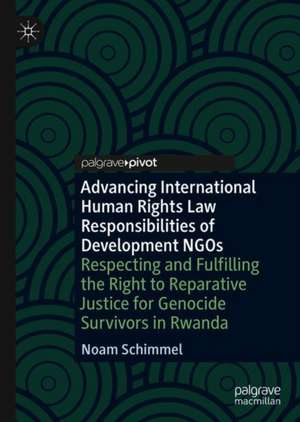Advancing International Human Rights Law Responsibilities of Development NGOs: Respecting and Fulfilling the Right to Reparative Justice for Genocide Survivors in Rwanda
Autor Noam Schimmelen Limba Engleză Hardback – noi 2020
Preț: 452.03 lei
Nou
Puncte Express: 678
Preț estimativ în valută:
86.49€ • 90.55$ • 71.57£
86.49€ • 90.55$ • 71.57£
Carte tipărită la comandă
Livrare economică 05-19 aprilie
Preluare comenzi: 021 569.72.76
Specificații
ISBN-13: 9783030502690
ISBN-10: 3030502694
Pagini: 130
Ilustrații: XIII, 140 p.
Dimensiuni: 148 x 210 mm
Greutate: 0.36 kg
Ediția:1st ed. 2020
Editura: Springer International Publishing
Colecția Palgrave Macmillan
Locul publicării:Cham, Switzerland
ISBN-10: 3030502694
Pagini: 130
Ilustrații: XIII, 140 p.
Dimensiuni: 148 x 210 mm
Greutate: 0.36 kg
Ediția:1st ed. 2020
Editura: Springer International Publishing
Colecția Palgrave Macmillan
Locul publicării:Cham, Switzerland
Cuprins
Chapter 1 Introduction.- Chapter 2 Defining Reparative Justice and Global Examples of its Implementation.- Chapter 3 Treaty Law for States, Soft Law addressing Non-State Actors and The Human Rights Responsibilities of NGOs.- Chapter 4 How International Human Rights Law Potentially Applies to Development NGOs in a Post Mass Atrocity Context Working in Partnership with/As Proxies of States.- Chapter 5 Rwanda Case Study.- Chapter 6 Conclusion.
Notă biografică
Noam Schimmel is Professorial Lecturer and was Visiting Associate Professor of Ethics and International Affairs at the Elliott School of International Affairs, George Washington University, and is Lecturer in International and Area Studies, University of California, Berkeley, USA. He is an associate fellow at the Centre for Human Rights and Legal Pluralism at McGill University’s Faculty of Law where he was previously O’Brien Fellow and Visiting Fellow. He has conducted human rights research as a research officer at the London School of Economics, at Kellogg College, Oxford University, and at the Bonavero Institute of Human Rights at Oxford University’s Faculty of Law. He was Associate Professor at the Future Generations University from 2018 to 2019.
Textul de pe ultima copertă
This book explores the potential responsibilities to respect, protect and fulfill international human rights law (IHRL) of a particular class of non-state actors: non-governmental organizations (NGOs). It calls for NGOs pursuing development to respect and fulfill the human right of genocide survivors to reparative justice in Rwanda. It argues that NGOs have social and moral responsibilities to respect and fulfill IHRL, and for greater accountability for them to do so. The book focuses on those NGOs advancing development in a post genocide transitional justice context acting simultaneously in partnership with state governments, as proxies and agents for these governments, and providing essential public goods and social services as part of their development remit. It defines development as a process of expanding realization of social, economic, and cultural rights addressing food security, economic empowerment/poverty reduction, healthcare, housing, education, and other fundamentalhuman needs while integrating these alongside the expansion of freedoms and protections afforded by civil and political rights. It uses post genocide Rwanda as a case study to illustrate how respect and fulfillment of the IHRL pertaining to reparative justice are hindered by failing to hold NGOs responsible for IHRL. Consequently, this results in discrimination against, marginalization, and the disadvantaging of survivors of the Rwandan genocide against the Tutsi and violations of their human rights.
Noam Schimmel is Professorial Lecturer and was Visiting Associate Professor of Ethics and International Affairs at the Elliott School of International Affairs, George Washington University, and is Lecturer in International and Area Studies, University of California, Berkeley, USA. He is an associate fellow at the Centre for Human Rights and Legal Pluralism at McGill University’s Faculty of Law where he was previously O’Brien Fellow and Visiting Fellow. He has conducted human rights research as a research officer at the London School of Economics, at Kellogg College, Oxford University, and at the Bonavero Institute of Human Rights at Oxford University’s Faculty of Law. He was Associate Professor at Future Generations University from 2018-2019.
Caracteristici
Contributes to ways of advancing NGO human rights accountability Argues that though states are ultimately held legally responsible for the acts of NGOs this should not prejudice NGOs being held socially and morally responsible Offers a useful and original contribution in an emerging area of study
